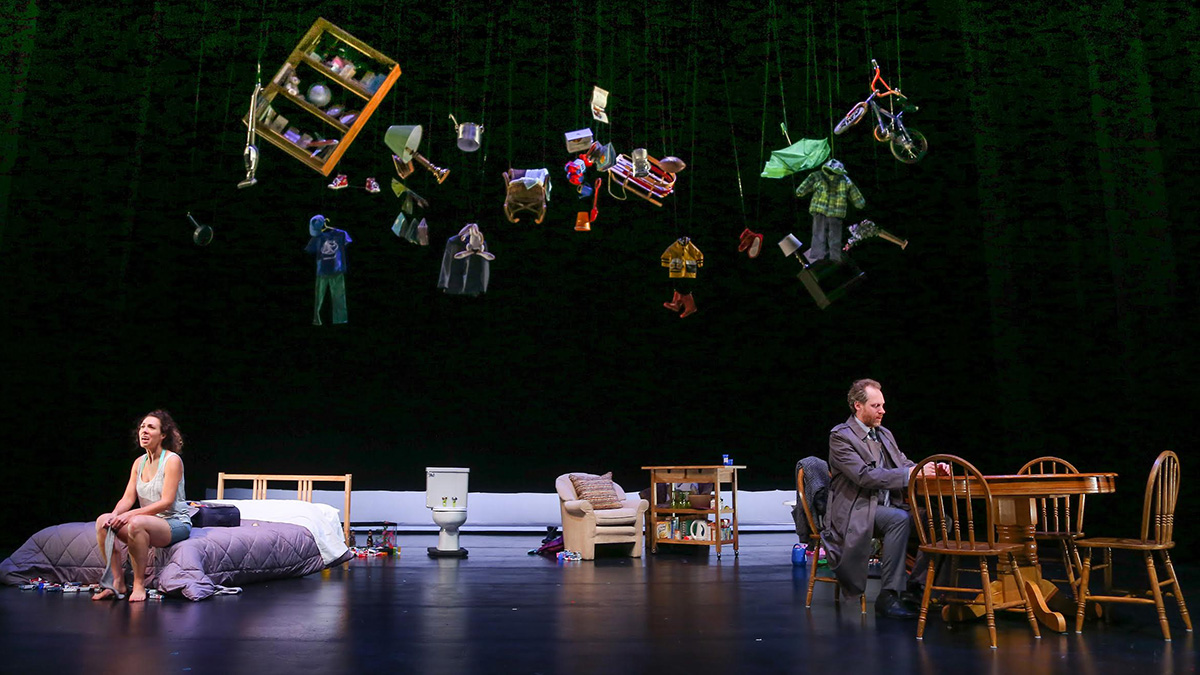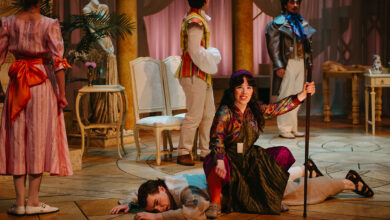Grief and surrealism in ‘God’s Ear’
 Image Courtesy of Ed Ellis
Image Courtesy of Ed EllisTwo parents have two children. Suddenly, one drowns, and they are left with the other.
From October 13 to 22, a student-directed play transforms the stage of the Timms Centre for the Arts. Written by Jenny Schwartz and directed by Suzie Martin, who is about to complete the university’s two-year MFA program in direction, God’s Ear is the erratic explosion that results when different forms of grief battle head-to-head. In it, Mel, the hauntingly routine-driven mother; Ted, the father who gets going when the going gets tough; and their two young children, Lanie (whose wits rival that of any other character) and Sam, are destroyed over Sam’s sudden and unexpected death. The play follows each of their journeys of dealing with grief from their loss. With appearances from the tooth fairy and G.I. Joe, the unbearably somber plot is filled with moments of shockingly dark comedy. Chaos holds the reigns to the production until a breaking point is hit, and only then do the clouds of hostility begin to clear.
Stylistically, the show is complex; romantic and surrealist, while still being influenced largely by theatre of the absurd.
“Time and space are nebulous things that can sort of be in two places at once,” explains Martin. “Jenny Schwartz, the playwright, captures the strangeness as well as the sadness of grief, and the terror of the unknown, the difficulty in reaching the people that you want to reach the most, because you’re both hurting and you can’t not hurt each other.”
Prior to being in Edmonton, the young director did her undergraduate degree in acting at the University of Winnipeg, and has been working in this field since 2008. She cannot remember a time when theatre was not something she wanted to spend her life doing.
“This notion of collage appeals to me, where everything is laid out and rammed together, without worrying too much about smoothing out the edges,” says Martin. “Just letting things smash into each other and stand there, next to each other, and let the meaning come from that layering.” Collage clearly influenced the set: pieces of furniture, items of children’s clothing, stuffed animals and other things hang from the roof, dangling just out of reach of the actors.
The heavy content of the show takes a toll on those involved. Lora Brovold, who acts as Mel and is a graduate of the drama department’s BFA acting program, often finds herself immersed in the world of the play.
“When you start working on a project, everything around you, all that you see and hear, is related to the project,” says Brovold. “There have been countless stories of people dealing with mortality, or their parents’ mortality, or how their parent died when they were ten, but when they’re 65, they suddenly realize, ‘Oh, my dad’s never coming back.’ This idea of magical thinking — this tug-of-war between denial and acceptance that chases us through life in incremental degrees — is a huge theme.”
This “magical thinking” is a concept that drives many of the characters forward through the play. Mel’s husband, Ted, is one who denies himself the truth. He buries his worries in Ellen’s and Ingrid’s and Lenora’s worries; piles of women’s underwear; and in innumerable airport visits to avoid the reality of his loss.
“I remember at Christmas last year, after working on this piece since that August, I was just sitting with my script . . . just reading the text really fast aloud on my own. About a third of the way in, I just started crying; I was like, “Whoa. Okay. Get it together.” And then a little further in, it happened again,” explains Martin. “The text kind of takes you to those places where you can just sort of fall in. I can still be moved to tears, which is pretty cool, considering how long I’ve been working at this project.”
But Martin does not have to go through this emotional journey on a daily basis in the same way that Brovold does for every show.
“Sometimes I go home after and have a cry,” says Brovold. “I’ll just breathe, lie on the floor, and let some stuff out; have a little quiet time to just go, ‘Okay. That is life. That is actually life.’”
The duo finds themselves seeking inspiration from everything around them. The youthful presence of the children in their lives as well as the BFA students involved in the piece are a light among the content’s dark reality.
“(When I see) my nieces and nephews, they’re always like, ‘Aunty, I made you this bracelet!’ and they put it on me, and it’s like, that touch is grist for the mill of human experience. That touch could never come again,” Brovold says. “I take all of these moments and put them in a box before the show that Mel can’t yet open because she’s not ready to unleash all of that.”
These moments of pure innocence and unknowingness are often represented in the comedic elements of the show. Through all of the heartbreak and the pain, moments of hope shine through, such as the constant representation of child-like fantasy in the tooth fairy, played by Sarah J. Culkin, or the journey of discovery that is the life of Lanie, Mel’s daughter, played by Emma Houghten. Both Culkin and Houghten are current BFA students. Brovold describes them as “a huge and beautiful distraction, in a great way.” She states that the way they are able to fill the room with exuberance truly inspires her.
“It’s all about the team,” says Martin on her support system. “I’ve had amazing collaborators who’ve taught me what my job actually is, instead of me having to teach them what their jobs are, because of how generous and creative and rigorous they are.”




